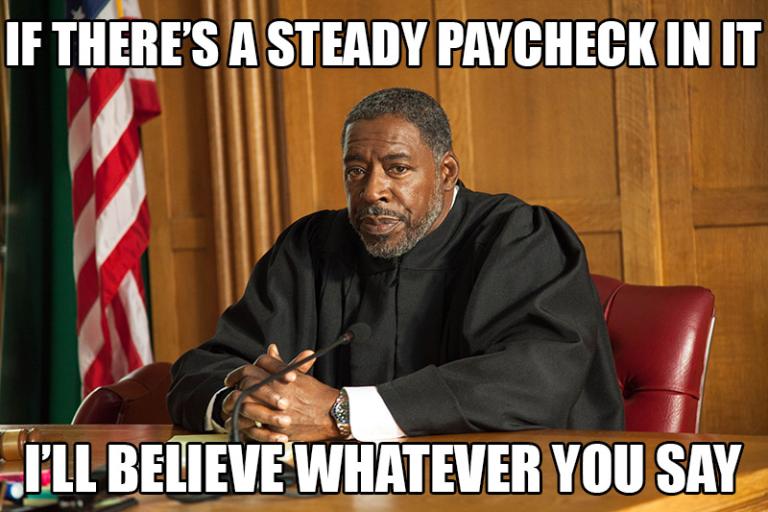Evangelical Christians want to be persecuted.
At some level, they need to be persecuted.
It’s woven into their central narrative. It is a part of how they were taught to understand themselves.
“If anyone wishes to come after me, he must deny himself, and take up his cross daily and follow me.” —Jesus.
“…that I may know him and the power of his resurrection and the fellowship of his sufferings, being conformed to his death.” —Paul
“To this you were called, because Christ suffered for you, leaving you an example, that you should follow in his steps.” –“Peter“*
But what happens when Christians inhabit a country like the United States, whose freedoms are already built around them and their own concerns? What happens when a nation is comprised of more Christians (whether culturally or otherwise) than people of any other faith?
What does a faith community founded upon martyrdom do when they aren’t actually being martyred in any way?
They fabricate their own martyrdom, that’s what they do. They invent their own persecution, either out of thin air or else out of their daily newsfeeds, taking each story and twisting it to reinforce their expected narrative. Somehow, in the end, the world must be against them, because if it is not, what would that say about how well they are identifying with their central founding figure?
“A slave is not greater than his master. If they persecuted me, they will also persecute you.” —Jesus
What Planet Do These People Live On?
 Take for example the movie God’s Not Dead 2, which comes out this weekend. I was able to catch this flick a night earlier than most because I live in Mississippi, and in my town the previous installment of this franchise sold out four weekends in a row. Maybe that has something to do with why we got a sneak preview of the new film the day before it was officially released.
Take for example the movie God’s Not Dead 2, which comes out this weekend. I was able to catch this flick a night earlier than most because I live in Mississippi, and in my town the previous installment of this franchise sold out four weekends in a row. Maybe that has something to do with why we got a sneak preview of the new film the day before it was officially released.
This film is about a fictional teacher named Grace Wesley (ugh, can they not do better with these names? The last one featured a protagonist named Josh Wheaton. It’s almost as if the writers feel like they have to make things overly obvious or else their target audience will miss something). Grace, played by former teenage witch Melissa Joan Hart, teaches history at a public school in Arkansas. In the course of a lesson on nonviolence she has the audacity to say the name of Jesus. [Gasp] Out loud. In class. The horror. She even has the nerve to cite a teaching about nonviolence from a passage in the Bible. The humanity.
Here in the real world, where most of us live, this is not in any way against the rules. I should know, because I taught history in a public high school, in the Bible Belt, no less. I had entire chapters I had to teach on both Christianity and on Islam, and I can assure you that religious figures have always been legitimate subjects for instruction in a public school classroom. In no way was the faith of the characters we studied off limits for our discussion in class.
But not in the world of God’s Not Dead. No, the people who produce (and patronize) this film franchise inhabit an alternate reality in which even saying the name of Jesus out loud is somehow illegal. I’m not entirely sure what law that breaks—there certainly isn’t anything in the Establishment Clause which suggests that you can’t even discuss religion at all.
When did it become breaking a rule
To say your name out loud in school?
Nor can I imagine a single school system in any major city in the Deep South which isn’t run entirely by devout evangelical Christians of one brand or another. I mean seriously. I defy you to even find a single public high school anywhere in the state of Arkansas which isn’t under the authority of a highly religious school board. You can’t do it. But in the imaginary world that God’s Not Dead inhabits, school boards will immediately suspend a teacher for daring to talk about Jesus, even when speaking with students off campus.
The reality is, as I’ve written about before, just the opposite. Teachers don’t lose their jobs for citing Bible verses in public schools in Arkansas, or Mississippi, or Alabama, or really anywhere in the United States. Where I live, they are more likely to lose their job if they openly identify as something other than a Christian. This I also know from experience.
[Read “The Sequel to God’s Not Dead Happened in My Classroom, But in Reverse“]
Miracle at 500 Woodlane Street
This second iteration of the God’s Not Dead franchise has all the things we’ve come to expect from Pure Flix Entertainment: It has the smiley, overly saccharine Christian protagonists who always seem to be responsible for anything good that happens in the movie. It has the angry, sour-faced atheists who seem determined above all else to destroy the faith of the believers in the story. It has people from other countries and religions mistreating their children, even hitting them for not keeping in line with their family’s traditions.
It also has the series of gratuitous chunks of preaching unnaturally worked into the dialogue between the characters. It will not let you escape the theater without hearing the evangelical Christian “plan of salvation” at least one time through, and it will feature at least one if not two or more conversion experiences in which a person goes from being a complete wuss or a jerk to being a bold, fearless hero in the course of a 24 hour period. “You seem different, somehow. You’ve changed,” a character will say. “I have. [beaming smile] Let me tell you about it.” The Sinner’s Prayer will be heard one way or another because it has to be done.
And finally, it also has the frequent cameos from evangelical heroes and celebrities like Pat Boone and former Arkansas Governor Mike Huckabee, plus random apologists like J. Warner Wallace, Lee Strobel, and Gary Habermas. It even ends with a Newsboys concert, just like last time, and features a new hit song which encapsulates the theme of the movie (more on that in a second). The only thing this was missing was an appearance by one of the guys from Duck Dynasty, which got mentioned at least twice in the script. Instead, in this film, one of their daughters played a main character. She is attractive and happy, so you know right away that she will be one of the Christians in the film.
So far in #GodsNotDead2 all the attractive people are Christians and the evil people are not. I predict the one exception will convert.
— Neil Carter (@godlessindixie) April 1, 2016
But this particular film takes a bizarre turn when, after the ACLU comes after the teacher for mentioning Jesus in class (because they totally do that, right?), the entire court case turns on a dime and becomes a defense of the historicity of Jesus and the reliability of the gospels.
Wait, what?
See, first of all, that’s not how this would even work. Assuming for the sake of argument that mentioning Jesus in class could get a teacher suspended (it won’t), and further assuming that the bad guys come for the blood of the individual teacher under consideration (they wouldn’t…they would come after the school system), the entire court case should have been about whether or not Ms. Wesley actually overstepped her legal boundaries by citing a teaching of Jesus during class. It should have been about exploring the boundaries of both the Establishment and Free Exercise Clauses of the Constitution. The judge, played by former Ghostbuster Ernie Hudson, quoted each of those clauses at the beginning of the case.
But then the case inexplicably changes course and becomes about something completely unrelated to the question under consideration. Instead of deliberating over whether or not Ms. Wesley broke the law (it feels like a criminal case, complete with a jury and everything), the defense redefines the case around proving whether or not the historical Jesus is based on reliable sources, and whether or not the gospels themselves are believable documents.
It’s like they’re ripping off the plot of Miracle on 34th Street. Only this time, it’s set in Arkansas at the state capitol. And instead of trying to establish whether or not Santa Claus is real, now they are trying to determine if Jesus was real. Because that would totally happen in real life in a court of law. And it’s totally relevant to the case at hand.
They call in witnesses pulled right off the shelves of your local Christian bookstore: Case for Christ author Lee Strobel climbs into the witness stand to give his take on the reliability of the Bible, followed by a fast-talking J. Warner Wallace (whom I’ve never heard of, but who apparently authored a book entitled Cold Case Christianity). Just a few seconds into this bizarre detour from the original purpose of this case, one begins to wonder if the writers of this movie have any idea at all how anything legal works in this country.
But again, you have to realize, these people do not live on the planet we call Earth. They inhabit an alternate reality, on a separate planet I’ll call Evangelica. On that planet, everything is different. On Evangelica, Christians are always patient and kind, while non-Christians are abusive and neglectful of their children. They are two-dimensional villains who break the law without remorse, and above all who hate all that Christianity specifically stands for.
“I hate what people like your client stand for!”
“We’re going to prove once and for all that God is dead!” (ACLU lawyer, played by Ray Wise)
Clearly the writers are not aware that the ACLU is just as likely to defend Christians as they are to defend anyone else. Check out this impressive list of cases if you don’t believe me.
I’m not sure I can even explain how the court case got decided, because they didn’t really explain it. But in the end, of course, they found in favor of the brave teacher who stood up for her faith no matter how ferociously the evil ACLU man came after her. To be honest, I’m not even sure what it was they were supposed to be deciding. Were they adjudicating on the historicity of Jesus? Were they merely seeking proof that the teacher genuinely believed the faith she defended during her trial? And why was any of this even a part of the trial in the first place?
This case was supposed to be about whether or not the class discussion violated the Establishment Clause. I don’t recall that actually being discussed in the movie in any detail. It so quickly became focused on defending the legitimacy of the Christian faith that the original point of the case got lost in the drama. And the judge was totally fine with this.
But none of that matters for the audience who came to see this. They just wanted to see their faith attacked in dramatic form, and they wanted to see the bad guys lose and the good guys (that’s them) win. They just wanted to see a bunch of people reinforcing the legitimacy of their faith, and they wanted to see cinematic evidence (an oxymoron to be sure) that indeed God is not dead.
The Evangelical Obsession with Victimization
Now, not all Christians gush over these films the way people in my town do. I know that. I realize that a lot of Christians have grown as weary as I have watching evangelicals obsess over their own victimization.
And trust me, they do gush. I don’t think I could handle a theater full of people doing what the guy behind me was doing throughout the duration of this movie. His overly cathartic emotional reactions to even the corniest lines really creeped me out. A whole cinema full of people like him would have been too much for me.
I know not all Christians are like him. But I also know that there are good reasons why this particular religion has come to produce the oddity that is the target audience of the God’s Not Dead film franchise. I believe there is something about martyrdom that is inextricably woven into the story of Christianity which no amount of distancing or redefining will ever be able to erase.
I submit that the heart of Christianity isn’t love, it’s victimhood. Even their definitions of love are tinged with elements of martyrdom.
— Neil Carter (@godlessindixie) March 30, 2016
The Christian faith was founded in an environment of persecution, so the concept of being treated unfairly for the sake of faith is woven into the fabric of the religion at its very core. Its central founding figure got crucified, which explains why a cross became the central symbol of this religion’s self understanding. For this reason, I don’t think this bizarre need to fantasize about persecution is a fluke.
I think their founding documents lead them to look for trouble even where there isn’t any. Maybe at times it even leads them to cause it. If only people would have a reason to oppose them, then they can feel that they are finally on the right track.
Just consider the lyrics of the climactic song from the end of the movie:
If serving you’s against the law of man
If living out my faith in you is banned
Then I’ll stand right before the jury
If saying I believe is out of line
If I’m judged cause I’m gonna give my life
To show the world the love that fills me
Then I want to be guilty
And there it is: Christians want to be guilty of something in that ironic sense in which Jesus was “guilty,” and yet they aren’t sufficiently like him in enough ways for that to even be a problem. They are more worried about getting into heaven than they are about doing anything useful to people on earth. They are more concerned with believing the right things about sin and salvation than they are with mitigating any of the problems people deal with in the present reality like poverty, famine, disease, and social injustice.
They are the proud guardians of the cure for a disease which no one but them thinks they even have. That makes them feel irrelevant, so they go looking for ways to make themselves needed in the world. For some of them, world events are supposed to comport with biblical prophecies; for others, the daily headlines should at least reinforce their suspicion that the world isn’t supposed to like them as they are.
It never seems to dawn on them that there could be other reasons why they are ever disliked. Lately, in America at least, they have come to define their own spirituality in terms of how vehemently they work to curtail the rights of others who are not like them. It is to this, they believe, that they have been called.
Like the pastor who gets handcuffed at the very end of the film (you have to stay past the credits to catch that scene) for not surrendering the transcripts of his sermons for public scrutiny, they are certain that the world will eventually hate them, and when that time comes, it will be for the right reasons. Because surely it won’t merely be because they keep standing in the way of social and scientific progress, or because they just keep doing really weird and frankly intellectually insulting things.
Persecution or Entitlement?
That is not the kind of suffering to which they were originally called. The writer of 1 Peter* warned them that it’s not enough to find that people don’t like you if the reasons they don’t like you are completely deserved.
For what credit is there if, when you sin and are harshly treated, you endure it with patience? But if, when you do what is right and suffer for it, you patiently endure it, this finds favor with God.
Evidently it was a problem from the very beginning, even in Peter’s day, that Christians wanted to pride themselves in how badly they were disliked. Evidently this has been a thing since the very inception of this religion. I see that not a lot has changed, except that now they are living in a country tailor-made to accommodate their religious freedoms.
And yet they are still not satisfied. They want more. They want things to be the way they used to be, back when they could say and do virtually anything they wanted to without worrying that it disadvantages other people who believe differently from them. Now they feel put out by the fact that even though they make up the overwhelming majority of Americans (doubly so in places like Arkansas), somehow they are being mistreated by having to let other people occupy the same space.
This newer way, the way of a more consistent religious pluralism, isn’t nearly as fun. In fact, it sucks. To them it feels like persecution. But in reality that’s just the way it feels to lose a little bit of the privilege you’ve always taken for granted.
When you’re accustomed to privilege, equality feels like oppression.
__________
Want to hear this article on audio? Seth Andrews of The Thinking Atheist reads it aloud here on his radio broadcast, starting at about the 6:00 mark:
[Image Source: GodsNotDeadTheMovie]
__________
* I put “Peter” in quotations because the authorship of that letter is highly disputed. Whatever the provenance of that letter, the fact remains that the persecution complex exemplified by the popularity of these films evidently predates American culture by many, many centuries. (h/t The Apostate)
Want to help support Godless in Dixie? Please consider giving to help me continuing to do what I do by clicking on the Donate button below:
Or by clicking on the image below to become a sponsor through Patreon.













